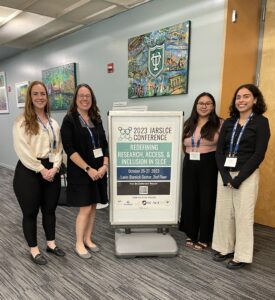Trinity’s Center for Hartford Engagement and Research (CHER) has recently presented findings from Hartford community engagement to national audiences through three events. During summer 2023, the CHER team presented at the Campus Compact Awards where they also accepted the Richard Guarasci Award for Institutional Transformation on behalf of Trinity College. The Liberal Arts Action Lab team presented their work at a national symposium at Duke University on project-based learning. Most recently, the CHER team joined with two recent alumnae to present a paper at the International Association for Service Learning and Community Engagement. The CHER team is grateful for these opportunities to present our community-engaged research experience and learn from colleagues and partners.
In June 2023, Professor Abigail Fisher Williamson, director of CHER, accepted the Campus Compact Richard Guarasci Award for Institutional Transformation on Trinity’s behalf. At the awards webinar, she presented on CHER’s work to evaluate and strengthen its programs to promote mutually beneficial relationships with the city of Hartford.

Also in June, the Liberal Arts Actions Lab team, including Professors Jeff Patridge (CT State at Capital Community College), Abby Fisher Williamson, Laura Minor, and Ozlem Atalay presented about the Liberal Arts Action Lab at a national symposium for project-based learning at Duke University. Trinity’s Liberal Arts Action Lab was one of 13 programs in the US and Canada selected to showcase projects at the symposium. Attendees expressed interest in the Action Lab’s unique, community-driven model, in which Hartford partners propose research questions and a Hartford Resident Advisory Board selects projects. Action Lab Director Laura Minor explained the value of learning from colleagues at universities nationwide:
“The Project-Based Learning Symposium at Duke University was incredibly valuable for our Action Lab team as an opportunity to connect with other professionals and share ideas. We all came away with new strategies to consider regarding engaging faculty, partnering with other institutions, and centering community voices in our programs. It was great to feel as though Trinity was leading the way in some of these areas, but also actively learning from others on how we could improve.”

Most recently, in October, members of CHER’s team, including Professor Williamson, Erica Crowley, and Karolina Barrientos ‘21 were joined by Bea Dresser ‘21 in presenting at the International Association for Research on Service-Learning and Community Engagement (IARSCLE) conference. They shared a paper entitled, “Including the Voices of Students of Color in Community Engaged Pedagogy,” which drew on 52 interviews with Trinity students conducted through a Center for Teaching and Learning Mellon Inclusive Pedagogy Grant in Summer 2021. Student researchers Bea Dresser ‘21 and Wendy Salto ‘21 conducted the interviews and contributed to the analysis. The paper argued that students of color often have distinct goals, experiences, and outcomes in a diverse, urban community-engaged learning setting, as compared to white students. In particular, students of color often bring experiences and skills that motivate and facilitate connections with community partners. The paper offered recommendations for how faculty can effectively recognize and address this heterogeneity in the community learning classroom.
Director of Community Learning Erica Crowley reflected on reactions to the presentation from national and international community engagement professionals: “The level of attention in our session underscored the importance of engaging students of color in this work. Our findings resonated a lot with other faculty and we were able to provide resources for faculty who want to implement more inclusive pedagogies.”
Karolina Barrientos, Program Manager of Trinfo.Cafe and the Office of Community Relations expressed the value of attending the conference: “In attending the IARSLCE conference, CHER was able to share findings from the evaluation conducted a few years ago. We brought insight on the experiences of students of color in community learning, a rather under-researched topic in the field. I learned that there are amazing scholars in the field, and it is important to continue the work we do and share it amongst colleagues.”
In the year ahead, CHER will continue to seek out opportunities to share findings from Hartford community-engaged research, as we continue to learn from our interactions with partners and other community engagement professionals.
